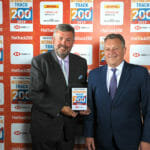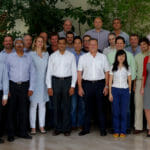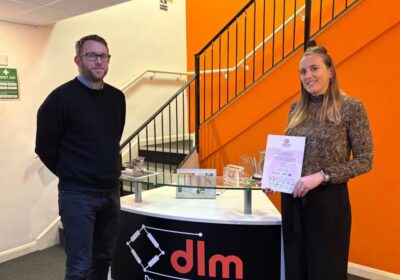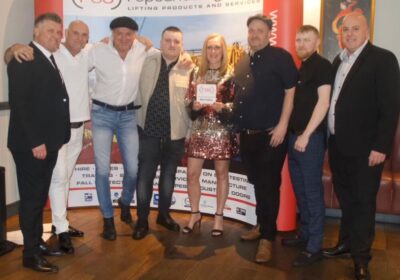When it began back in 1981, thermal technology specialist HRS Heat Exchangers (then called Heat Recovery Systems) was a sole enterprise, acting as the UK agent for a Swedish manufacturer. Despite the long hours, single-handedly taking care of imports, sales, quotes and deliveries paid off for founder and managing director Steven Pither, as the company turned over £32,000 in its first 12 months.
Fast forward 38 years and HRS has received the impressive accolade of being named one of the UK’s top 200 fastest-growing firms for international sales in the Sunday Times HSBC International Track 200 league table. Specialising in the design and manufacture of its own, patented heat exchangers to the food, environmental, pharmaceutical and wastewater sectors, the company has changed immeasurably since its early days. It now boasts over 200 direct employees and has a network of offices and agents throughout the world.
HRS’ most recent annual turnover was £35m, helped in no small part by a highly successful export strategy which has resulted in global sales worth £20.7m (out of total sales of £28.3m). Here, Steven reveals the five cornerstones that have helped him take the company from a domestic start-up to a global corporation.
Invest in people
Look closely at any successful business and you’ll find a team of talented and committed individuals; HRS Heat Exchangers is no exception. “Our staff turnover rate is less than five per cent,” Steven proudly reveals. “One employee has been with the firm since year three, and there are many more with over 20 years’ service. To build a successful business, you need core competency everywhere – engineering, sales, finance, etc – and not just in one department. Experience, reliability and knowledge are crucial to building a reputation, so we’ve worked hard to develop strong teams across the board that can deliver this.”
Like many engineering firms, HRS is at the sharp end of the skills crisis and Steven understands the importance of investing in people. “With the industry-wide skills shortage, it can be a challenge to recruit good staff, which is why strive to hold onto the ones we have,” he explains. “To encourage staff retention, we offer competitive salaries, profit shares and bonuses; provide career development opportunities; and try to be as flexible as possible. We also offer apprenticeships, to keep the next generation of talent coming through.”
- Steven Pither (R) with company secretary Robert Twydle, receiving HRS’ International Track 200 League Table award
- Steven Pither (centre, front) with International Sales & Marketing Director Matt Hale (centre, back) and the UK team
- HRS’ international staff at a group sales meeting in Spain
- Steven Pither in the early 1990s
Think global
The importance of good people extends to HRS’ international operations. Although it relies on agents in some territories, the company has its own offices in Spain, USA, Australia, New Zealand, Malaysia, Mexico, Russia and India.
“The vision was always to build an international heat exchanger brand,” reveals Steven. “An international presence helps you to be taken seriously by big customers; it builds confidence and trust. However, I decided early on that if HRS was to become globally successful, it was essential to find local talent in each territory who could communicate in the same language, and with the same cultural references, as our customers.”
The international gamble certainly paid off, as a combination of strong local teams and proven products is helping HRS to enjoy an impressive 41 per cent international sales growth (annual average based over two years). Steven firmly believes that this will protect the business from the kind of local fluctuations that can hinder domestic-focused companies: “Our reach is now so wide that we get enquiries from all over the world. This helps us to weather local storms, such as Brexit. The fact that our products are used in a wide variety of applications across a broad range of sectors also provides a cushion against the ups and downs that may affect one particular industry.”
Focus on innovation
Although heat exchangers remained a core focus, as the business began to grow, Steven realised that his customers were looking for more than just pieces of kit; they were seeking integrated systems, which could provide entire solutions. To fulfil this growing demand, HRS acquired its own UK manufacturing site, and soon expanded with a bigger facility in India. These are supported by two workshops in Spain, where the company also houses its R&D and design departments. HRS’ range now includes entire wraparound solutions such as evaporators and concentrators, as well as an ever-expanding portfolio of heat exchangers.
“Thanks to our increased manufacturing capabilities, we now offer a wide range of patented and innovative designs, such as our R Series of scraped surface heat exchangers, specifically designed for viscous and challenging products with extremely high fouling properties,” Steven explains. “Our product development is customer-led, so our range comprises everything from heat exchangers with gentle handling capabilities for shear-sensitive liquids or soft fruits, to those with hygienic handling capabilities for the most stringent food or pharmaceutical demands.”
Keep the cash flowing
While a focus on people and products is essential to success, according to Steven the biggest restriction to the growth of British businesses is access to finance. This is especially true for manufacturers, as banks will often refuse to value a product before it is built; even if a company has the raw materials. Developing good credit terms with your supplier is therefore crucial.
“Particularly in the early days, late payments and cash flow were a challenge,” reveals Steven. “We were importing equipment and had short credit terms from our supplier, yet our customers were requesting long payment terms. This was a problem for us, so we worked hard on building a good relationship with our suppliers, proving ourselves as reliable and trustworthy. Over time, they extended our credit terms from 30 to 60 days, eventually increasing it to 90 days. The importance of this cannot be underestimated; you can have great products and a great team, but if you haven’t got cash, you’re in a dangerous position.”
Plan for the future
Finally, no business ever became successful by standing still. Despite HRS’ significant recent growth, Steven is still driving the company forward with plans for a testing facility in Spain, new process solutions, innovative prototypes, and an expanded core range of heat exchanger products.
HRS is also planning to offer a subscription to its software system, which will enable engineers to model different applications. The company hopes it will generate increased sales, as well as allowing them to spot trends by tracking what people are modelling.
And HRS’ international plans aren’t finished yet, either; Steven is focusing on developing business in Australia, Russia and Latin America. But as the company has a five-year plan to increase sales to £60m, could he be tempted to branch out even further? “We’ve got no immediate plans to open any more international offices,” he admits. “However, there are still some territories which appeal to me, such as China, Africa, and the Middle East. So, never say never!”











